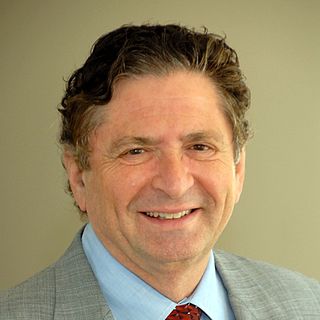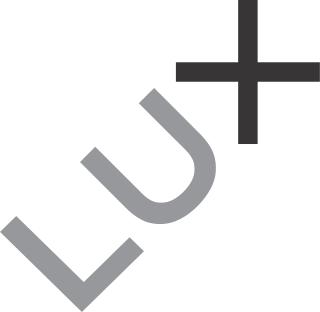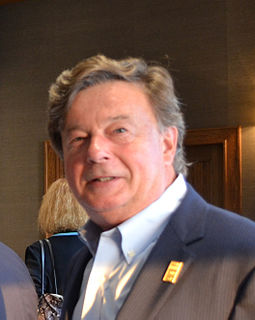Related Research Articles
Sheridan Gray Snyder OBE is an entrepreneur, venture capitalist, and philanthropist in the biotechnology industry. He is the founder and CEO of Biocatalyst, but also a "serial entrepreneur", a founder of Genzyme and many other companies. Snyder, who was the University of Virginia's best tennis player when he was studying for his BA in French and Romance Languages there in the 1960s, made "major contributions to the popularisation of tennis in the USA." He co-founded the National Junior Tennis League that reaches 250,000 inner-city young people and constructed a new tennis center at the University of Virginia.

Dr. Cristina Garmendia y Mendizábal is a Spanish biologist and businesswoman. With no previous political career, she was appointed as Minister of Science and Innovation in April 2008 by the President of the Government of Spain, Jose Luis Rodriguez Zapatero.
The California Institute for Quantitative Biosciences (QB3) is a nonprofit research and technology commercialization institute affiliated with three campuses of the University of California in the San Francisco Bay Area: Berkeley, San Francisco, and Santa Cruz. QB3's domain is the quantitative biosciences: areas of biology in which advances are chiefly made by scientists applying techniques from physics, chemistry, engineering, and computer science.

Ivor Royston, M.D., is an oncologist, researcher, scientist, entrepreneur and venture capitalist, recognized for his efforts to develop treatments for multiple disease targets and to fund biotechnology companies with promising science, technology or medicines. He speaks regularly at healthcare conferences and symposia throughout the United States, Europe and Asia.

Francisco Partners is an American private equity firm focused exclusively on investments in technology and technology-enabled services businesses. Founded in August 1999 and based in San Francisco with offices in London and New York, Francisco Partners Management L.P. has raised approximately USD $24 billion in committed capital as of June 2020 when the firm raised nearly $10 billion for tech company investments. As of 2020, Francisco Partners had more than $25 billion in assets under management and invested in over 300 companies in the technology sector.
Alta Partners is a venture capital firm based in San Francisco which invests primarily in biotechnology and life science companies.
Sofinnova is the name shared by two venture capital firms, Sofinnova Partners and Sofinnova Ventures. The name Sofinnova is a contraction of the French, "Société de Financement de l’Innovation" or, Innovation Venture Capital Company. Both firms trace their roots back to Sofinnova SA, an investment institution founded in Paris in 1972. The two firms have raised ~$4B since inception and have generally shared a similar investment strategy of financing projects and ideas in the life sciences and technology sectors. The two firms distinguish themselves on the basis of their target geographies, stage of investment, and sectors. They have been independent entities since 1997.

Lux Capital is a venture capital firm based in New York City. It was founded in 2000, and focuses on investments in emerging technologies.

DocuSign, Inc. is an American company headquartered in San Francisco, California, that allows organizations to manage electronic agreements. As part of the DocuSign Agreement Cloud, DocuSign offers eSignature, a way to sign electronically on different devices. DocuSign has over 1 million customers and hundreds of millions of users in more than 180 countries. Signatures processed by DocuSign are compliant with the US ESIGN Act and the European Union's eIDAS regulation, including EU Advanced and EU Qualified Signatures.
Atlas Venture is an early-stage venture capital firm that invests in life sciences startup companies in the U.S. Atlas is headquartered in Cambridge, Massachusetts, where the majority of its investments are located. Atlas rolled out its eleventh biotech fund totaling $350 million in June 2017, after closing its tenth fund in April 2015, with $280 million in commitments.
DNAnexus is an American company that provides a cloud-based data analysis and management platform for DNA sequence data. It is based in Mountain View, California, and was founded in 2009 by Stanford University professors Serafim Batzoglou and Arend Sidow and Stanford computer scientist Andreas Sundquist.

SOSV is a venture capital and investment management firm that provides seed, venture and growth stage funding to startup companies in the technology sector. The company's focus is on accelerating startups via their market specific seed accelerator programs located in Europe, Asia and the USA. The firm is made up of 8 general partners, 120+ full-time support staff and thousands of worldwide mentors. SOSV is headquartered in Princeton, New Jersey, with back office operations in Cork, Ireland, and flagship offices in San Francisco, Shenzhen, Shanghai, Taipei, New York, Cork, and London.
David Grainger is a partner at medicxi, a European life sciences-oriented venture capital firm and chief executive officer of Methuselah Health Ltd., a drug development company doing proteomics research in the longevity space.
BioMotiv is an accelerator company associated with The Harrington Project, a $340 million initiative centered at University Hospitals of Cleveland. Therapeutic opportunities are identified through relationships with The Harrington Discovery Institute, university and research institutions, disease foundations, and industry sources. Once opportunities are identified, BioMotiv oversees the development, funding, active management, and partnering of the therapeutic products.

OS Fund is an American venture capital fund that invests in early-stage science and technology companies.

Henri A. Termeer was a Dutch biotechnology executive and entrepreneur who is considered a pioneer in corporate strategy in the biotechnology industry for his tenure as CEO at Genzyme. Termeer created a business model adopted by many others in the biotech industry by garnering steep prices— mainly from insurers and government payers— for therapies for rare genetic disorders known as orphan diseases that mainly affect children. Genzyme uses biological processes to manufacture drugs that are not easily copied by generic-drug makers. The drugs are also protected by orphan drug acts in various countries which provides extensive protection from competition and ensures coverage by publicly funded insurers. As CEO of Genzyme from 1981 to 2011, he developed corporate strategies for growth including optimizing institutional embeddedness nurturing vast networks of influential groups and clusters: doctors, private equity, patient-groups, insurance, healthcare umbrella organizations, state and local government, alumni. Termeer is "connected to 311 board members in 17 different organizations across 20 different industries" He has the legacy of being the "longest-serving CEO in the biotechnology industry.

Aurora Biosciences was a biotechnology company founded in 1995 in San Diego to commercialize fluorescence assays based on Roger Y. Tsien's discoveries concerning green fluorescent protein and its uses in basic research - work for which Tsien eventually won the 2008 Nobel Prize in chemistry along with two other chemists.
Abingworth LLP is a London-based independent venture capital firm and registered investment advisory firm founded in 1973 by a pair of London stockbrokers, Peter Dicks and Anthony Montagu. Abingworth had initially sought to extend its investments into the biotechnology industry in the late 1980s, and has subsequently been investing in life science and healthcare services companies since at least 2001, and had expanded to include information technology firm investments by 2016.
Foresite Capital is an American venture capital and growth equity firm headquartered in San Francisco. As of March 2021, the company had raised four funds: Foresite Capital Fund I, II, III, IV and V.

Alexandria Real Estate Equities, Inc. is an American real estate investment trust that invests in office buildings and laboratories leased to tenants in the life science and technology industries.
References
- ↑ Smith, L. "The Innovators: Meet the 65 Companies and Their Owners Who Have Conjured up the Latest Wave of Products, Services, and Technologies." (May 1, 2001.) 10/12/08 <http://www.cnnmoney.com.>
- ↑ Huggett, B. “Signature Raises $17 M Privately For PhenoDynamic Technology.” Bioworld Today Archives. September 7, 2000.
- ↑ “Signature Bio” 10/10/08 <http://www.archives.org.> Archived webpage: <http://signaturebio.com Archived 2003-12-01 at the Wayback Machine >
- ↑ “Signature BioScience CEO Goes to Protein Design Labs.” San Francisco Business Times. November 5, 2002.
- ↑ Article reference number: 112943. “Signature BioScience Announces Management Team Changes.” Biomedical NewsSearcher. November 5, 2002.
- ↑ “Acacia Research Names Dr. Amit Kumar as Vice President, Life Sciences; Medical Industry Entrepreneur Will Manage New San Francisco Area Office” Business Network (July 17, 2000) 10/11/08 <http://findarticles.com/p/articles/mi_m0EIN/is_2000_July_17/ai_63493789>
- ↑ Article reference number: 47955. "Signature Acquires Protein Design Labs’ Small Molecule Group." Biomedical NewsSearcher. January 29, 2002.
- ↑ Bishop, A. "Signature BioScience Signs 475 Brannan Lease." San Francisco Business Times. October 22, 2001.
- ↑ Doherty, B. "San Francisco Seeks Biotech Buy-In." San Francisco Business Times. March 1, 2002.
- ↑ Levine, D. "Signature Bio’s Burnout Singes City’s Ambition." Business Times. April 28, 2003.
- ↑ “Signature BioScience Signs With geneticXchange for Its discoveryHub Data Integration Solution.” Business Network. (June 4, 2002) 10/11/08 <http://findarticles.com/p/articles/mi_m0EIN/is_2002_June_4/ai_86679283>
- ↑ "MARK MCDADE - SIGNATURE BIOSCIENCE: TWST." 10/11/2008 <http://www.twst.com/notes/articles/nah364.html>.
- ↑ "Signature BioScience." Knowledge Express 2008.10/11/2008 <http://www.knowledgeexpress.com/recordview.asp?rid=4509&dbid=56&ListLoc=23&SourceFilter=%5B%5D>.
- ↑ Hefti, J., Pan, A., and Kumar, A., 1999. Sensitive detection method of dielectric dispersions in aqueous-based, surface-bound macromolecular structures using microwave spectroscopy. Applied Physics Letters 75(12):1802-1804.
- ↑ Huggett, B. “Signature Raises $17 M Privately For PhenoDynamic Technology.” Bioworld Today Archives. September 7, 2000.
- ↑ "Signature BioScience Raises $17 million." San Francisco Business Times. September 6, 2000
- ↑ Article reference number: 35208. "Signature Closes $43 million Series D Financing Round." Biomedical NewsSearcher. July 9, 2001.
- ↑ Smith, L. "The Innovators: Meet the 65 Companies and Their Owners Who Have Conjured up the Latest Wave of Products, Services, and Technologies." (May 1, 2001.) 10/10/08 <http://www.cnnmoney.com>
- ↑ Levine, Daniel (April 17, 2003). "Signature BioScience to shut down". San Francisco Business Times. Retrieved 2008-10-10.